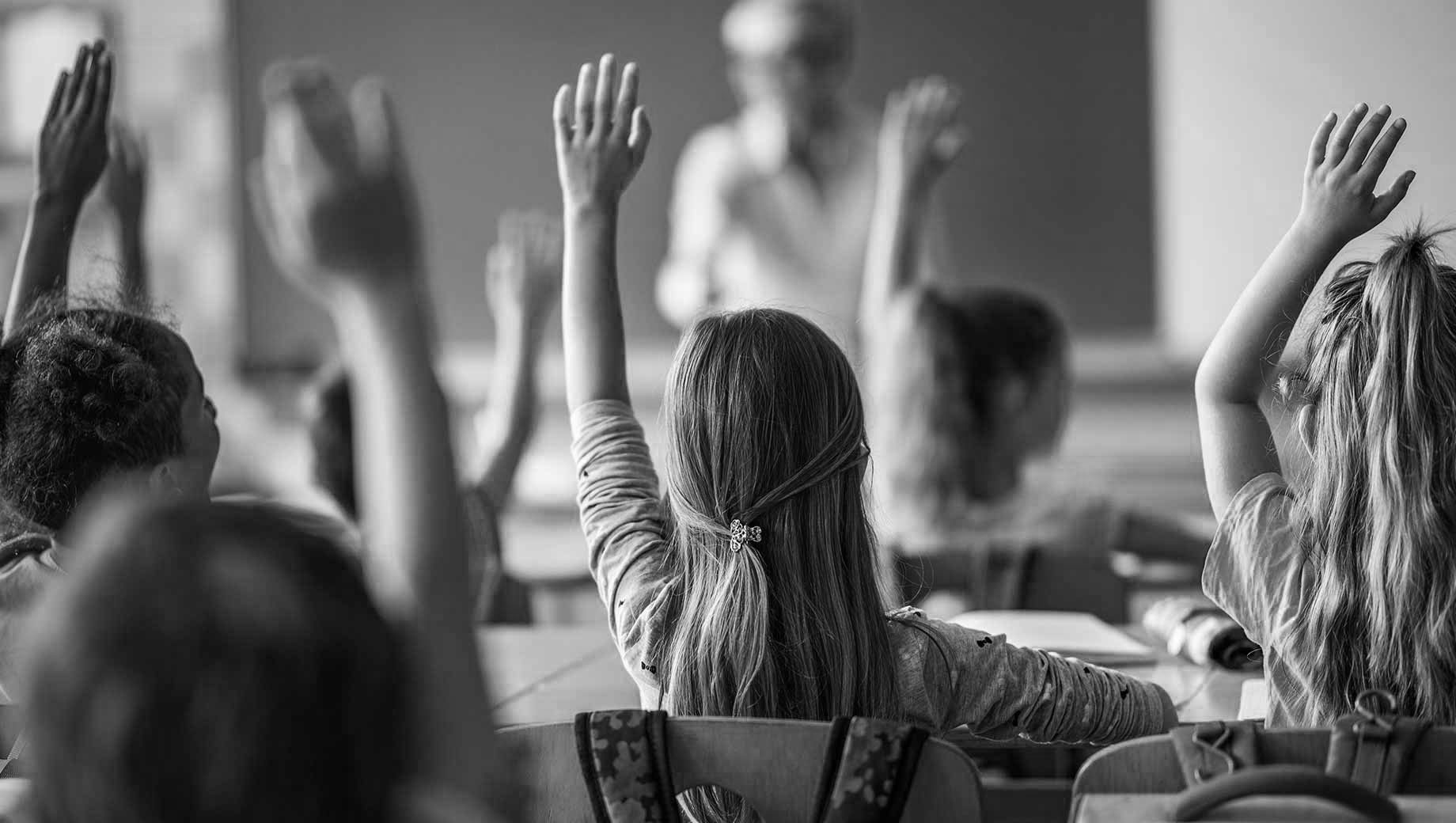Story Highlights
- 51% of U.S. adults are satisfied with quality of U.S. K-12 education
- Current satisfaction is highest since 2004
- Most parents remain satisfied with own children's education
WASHINGTON, D.C. -- Gallup's annual update of how Americans feel about the quality of primary and secondary education in the U.S. finds the public relatively upbeat this year. For the first time since 2004, a slim majority of U.S. adults, 51%, are satisfied with the overall quality of education that students in kindergarten through grade 12 receive. This is up from 43% in 2018 and an average 45% since 2005.

For most of Gallup's trend line on Americans' views of K-12 education since 1999, satisfaction has ranged between 43% and 48%. One exception was a drop to 36% in 2000, likely reflecting the focus in that year's presidential campaign on the need for education reform. The other exception was a spike in satisfaction to 53% in 2004.
The reason for today's increase to 51% is not clear, but it could reflect Americans' generally positive outlook toward the economy, combined with a lack of any major newsmaking debates on education, such as occurred in the past with the federal No Child Left Behind Act and, more recently, the Common Core educational standards.
The important qualifier is that, while 51% are at least somewhat satisfied with U.S. educational quality, only 10% say they are completely satisfied. At the other end of the spectrum, 32% are somewhat dissatisfied and 15% are completely dissatisfied.
These results are from Gallup's 2019 edition of its annual Work and Education poll, conducted Aug. 1-14.
Lower-Income Americans' Views of Education Have Improved
Comparing Americans' satisfaction with U.S. education today to the average level of satisfaction over the past two years, satisfaction is up equally among gender, age and partisan subgroups.
By contrast, satisfaction has increased more among lower-income Americans -- those in households earning less than $40,000 annually -- than among middle- and upper-income adults. Satisfaction has also improved among blacks and Hispanics, as well as among parents of children under 18. Yet, there has been no change among whites and adults without children under 18.
| 2017-2018 | 2019 | Change | |||||||||||||||||||||||||||||||||||||||||||||||||||||||||||||||||||||||||||||||||||||||||||||||||
|---|---|---|---|---|---|---|---|---|---|---|---|---|---|---|---|---|---|---|---|---|---|---|---|---|---|---|---|---|---|---|---|---|---|---|---|---|---|---|---|---|---|---|---|---|---|---|---|---|---|---|---|---|---|---|---|---|---|---|---|---|---|---|---|---|---|---|---|---|---|---|---|---|---|---|---|---|---|---|---|---|---|---|---|---|---|---|---|---|---|---|---|---|---|---|---|---|---|---|---|
| % | % | pct. pts. | |||||||||||||||||||||||||||||||||||||||||||||||||||||||||||||||||||||||||||||||||||||||||||||||||
| U.S. adults | 45 | 51 | 6 | ||||||||||||||||||||||||||||||||||||||||||||||||||||||||||||||||||||||||||||||||||||||||||||||||
| Men | 43 | 50 | 7 | ||||||||||||||||||||||||||||||||||||||||||||||||||||||||||||||||||||||||||||||||||||||||||||||||
| Women | 47 | 52 | 5 | ||||||||||||||||||||||||||||||||||||||||||||||||||||||||||||||||||||||||||||||||||||||||||||||||
| 18-34 | 40 | 47 | 7 | ||||||||||||||||||||||||||||||||||||||||||||||||||||||||||||||||||||||||||||||||||||||||||||||||
| 35-54 | 47 | 51 | 4 | ||||||||||||||||||||||||||||||||||||||||||||||||||||||||||||||||||||||||||||||||||||||||||||||||
| 55+ | 47 | 54 | 7 | ||||||||||||||||||||||||||||||||||||||||||||||||||||||||||||||||||||||||||||||||||||||||||||||||
| Republican | 46 | 51 | 5 | ||||||||||||||||||||||||||||||||||||||||||||||||||||||||||||||||||||||||||||||||||||||||||||||||
| Independent | 42 | 49 | 7 | ||||||||||||||||||||||||||||||||||||||||||||||||||||||||||||||||||||||||||||||||||||||||||||||||
| Democrat | 48 | 51 | 3 | ||||||||||||||||||||||||||||||||||||||||||||||||||||||||||||||||||||||||||||||||||||||||||||||||
| $100,000+ | 42 | 47 | 5 | ||||||||||||||||||||||||||||||||||||||||||||||||||||||||||||||||||||||||||||||||||||||||||||||||
| $40,000-<$100,000 | 44 | 48 | 4 | ||||||||||||||||||||||||||||||||||||||||||||||||||||||||||||||||||||||||||||||||||||||||||||||||
| Less than $40,000 | 48 | 59 | 11 | ||||||||||||||||||||||||||||||||||||||||||||||||||||||||||||||||||||||||||||||||||||||||||||||||
| Non-Hispanic white | 44 | 47 | 3 | ||||||||||||||||||||||||||||||||||||||||||||||||||||||||||||||||||||||||||||||||||||||||||||||||
| Non-Hispanic black | 41 | 53 | 12 | ||||||||||||||||||||||||||||||||||||||||||||||||||||||||||||||||||||||||||||||||||||||||||||||||
| Hispanic | 56 | 66 | 10 | ||||||||||||||||||||||||||||||||||||||||||||||||||||||||||||||||||||||||||||||||||||||||||||||||
| College graduate | 43 | 46 | 3 | ||||||||||||||||||||||||||||||||||||||||||||||||||||||||||||||||||||||||||||||||||||||||||||||||
| Not college graduate | 46 | 53 | 7 | ||||||||||||||||||||||||||||||||||||||||||||||||||||||||||||||||||||||||||||||||||||||||||||||||
| Child under 18 | 45 | 58 | 13 | ||||||||||||||||||||||||||||||||||||||||||||||||||||||||||||||||||||||||||||||||||||||||||||||||
| No child under 18 | 45 | 48 | 3 | ||||||||||||||||||||||||||||||||||||||||||||||||||||||||||||||||||||||||||||||||||||||||||||||||
| 2017-2018 data based on combined August Work and Education polls | |||||||||||||||||||||||||||||||||||||||||||||||||||||||||||||||||||||||||||||||||||||||||||||||||||
| Gallup | |||||||||||||||||||||||||||||||||||||||||||||||||||||||||||||||||||||||||||||||||||||||||||||||||||
U.S. Education Quality Not a Partisan Issue
Perhaps because education is perceived as more of a local than a federal issue, Gallup has found only slight partisan distinctions in Americans' ratings of U.S. education across presidential administrations.
-
Since 2017, under Republican Donald Trump's presidency, there has been virtually no partisan difference in Americans' satisfaction with U.S. education, similar to the partisan consistency seen from 2001 to 2008 under Republican President George W. Bush.
-
A modest partisan gap emerged during Democrat Barack Obama's presidency, when Democrats were slightly more likely than Republicans to be satisfied, 50% vs. 41%. But this was attributable to Republicans' becoming less satisfied. Democrats' satisfaction has been steady near 50% across presidential administrations.
| 2001-08 (G.W. Bush) | 2009-16 (Barack Obama) | 2017-19 (Donald Trump) | |||||||||||||||||||||||||||||||||||||||||||||||||||||||||||||||||||||||||||||||||||||||||||||||||
|---|---|---|---|---|---|---|---|---|---|---|---|---|---|---|---|---|---|---|---|---|---|---|---|---|---|---|---|---|---|---|---|---|---|---|---|---|---|---|---|---|---|---|---|---|---|---|---|---|---|---|---|---|---|---|---|---|---|---|---|---|---|---|---|---|---|---|---|---|---|---|---|---|---|---|---|---|---|---|---|---|---|---|---|---|---|---|---|---|---|---|---|---|---|---|---|---|---|---|---|
| % | % | % | |||||||||||||||||||||||||||||||||||||||||||||||||||||||||||||||||||||||||||||||||||||||||||||||||
| Republicans | 50 | 41 | 48 | ||||||||||||||||||||||||||||||||||||||||||||||||||||||||||||||||||||||||||||||||||||||||||||||||
| Independents | 45 | 43 | 45 | ||||||||||||||||||||||||||||||||||||||||||||||||||||||||||||||||||||||||||||||||||||||||||||||||
| Democrats | 47 | 50 | 49 | ||||||||||||||||||||||||||||||||||||||||||||||||||||||||||||||||||||||||||||||||||||||||||||||||
| Data based on combined August Work and Education polls for each period | |||||||||||||||||||||||||||||||||||||||||||||||||||||||||||||||||||||||||||||||||||||||||||||||||||
| Gallup | |||||||||||||||||||||||||||||||||||||||||||||||||||||||||||||||||||||||||||||||||||||||||||||||||||
Parental Satisfaction With Children's Education Remains High
Parents' satisfaction with their own children's education is typically much higher than public satisfaction with K-12 education generally. Currently, 82% of parents say they are satisfied with the education their oldest child is receiving. That includes equal proportions saying they are completely satisfied (41%) or somewhat satisfied (41%). Eighteen percent are completely or somewhat dissatisfied.
The latest combined 82% parental satisfaction reading is higher than the average 76% Gallup has recorded since 1999. However, today's figure is statistically similar to the level in several individual years -- most recently 2017, when 79% were satisfied, and the nominal high of 83% in 1999.

Overall parental satisfaction with their children's education is similar across most demographic subgroups, but upper-income parents are more satisfied with their child's education than those earning less than $40,000. The rates are 85% of those earning $100,000 or more and 81% among those earning between $40,000 and $99,999, versus 73% of those earning less than $40,000.
Bottom Line
In a year when education reform has not been a front-page newsmaker, Americans' views of the quality of education in kindergarten through grade 12 have improved to the highest level Gallup has seen in 15 years. Lower-income and minority groups are largely responsible for this improvement. At the same time, parents of school-aged children remain largely satisfied with their students' education. Still, with less than half "completely satisfied," there remains much room for improvement.
View complete question responses and trends.
Learn more about how the Gallup Poll Social Series works.




